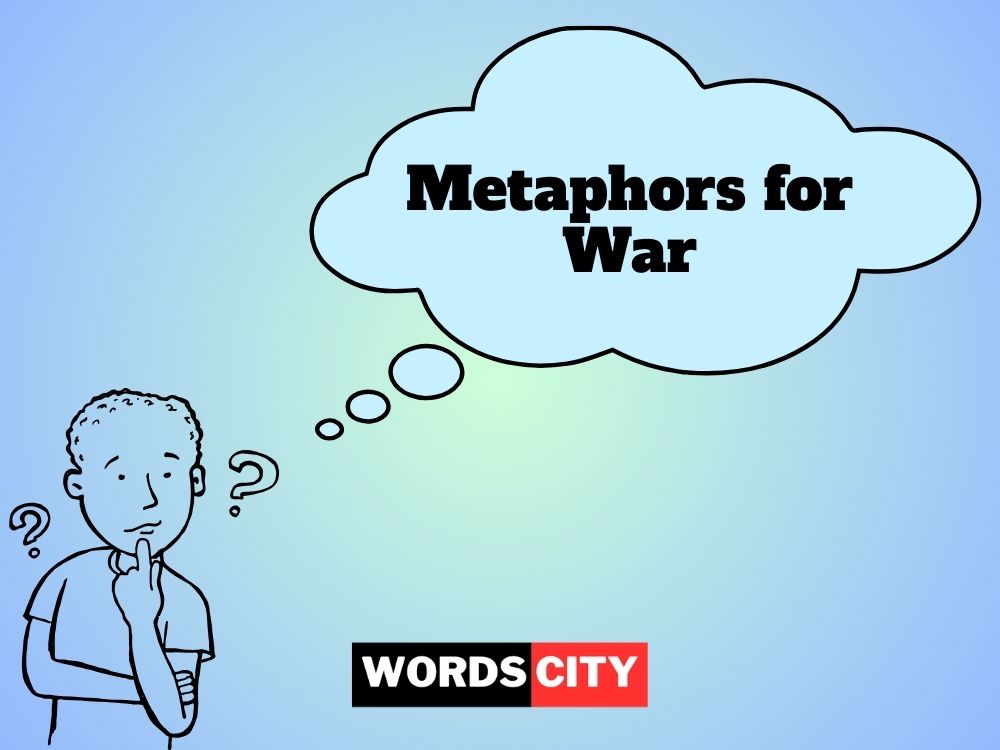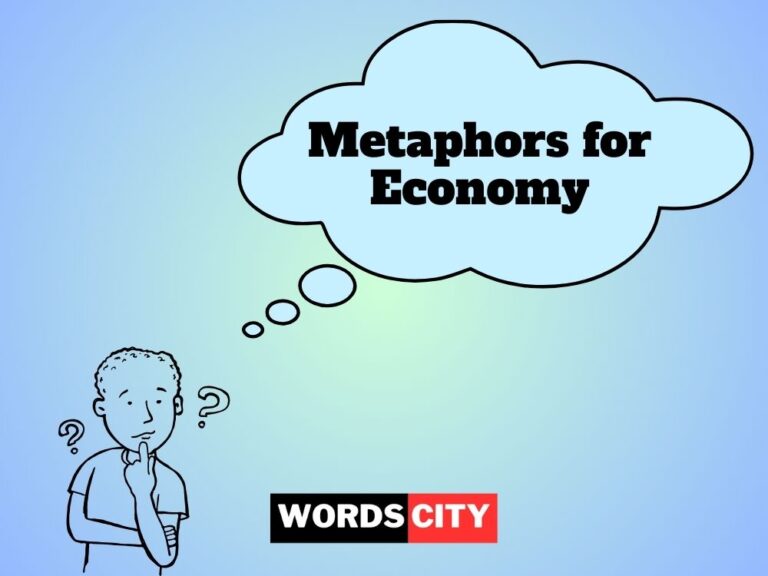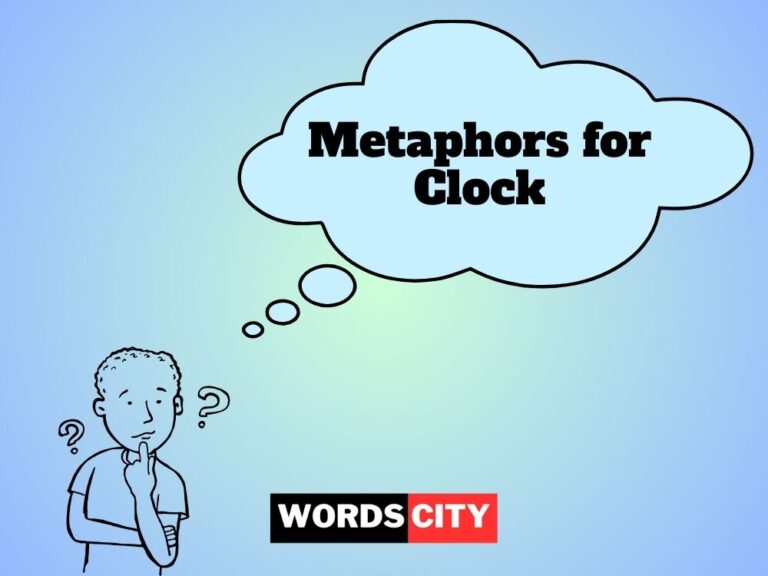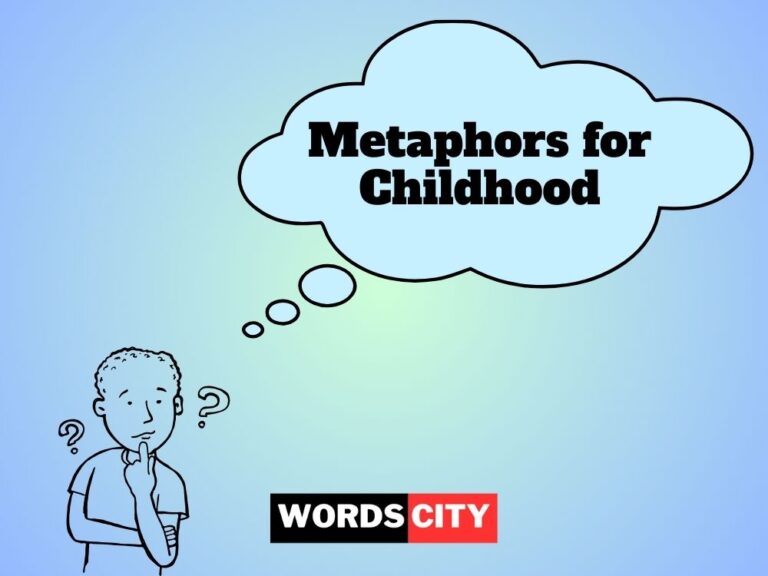War is one of the most powerful forces that shapes our world. It is not just about weapons and battles—it’s about strategy, conflict, sacrifice, destruction, and sometimes, the painful road to peace. But how do we talk about war in a way that captures its full weight and emotion? One of the most effective ways is through metaphors.
Metaphors give us a way to picture the invisible. They help us take something as complex and devastating as war and describe it in familiar, understandable terms. War can be a fire, devouring everything in its path—or a chess game, full of cunning and calculation. These images not only help us describe war but also reflect the deeper emotions, costs, and consequences that come with it.
Let’s explore some of the most vivid metaphors for war, what they mean, and how they’re used.
Metaphors for War
1. War is a Fire
Meaning: It spreads quickly and destroys everything in its way.
In a Sentence: Once the first shot was fired, the war spread like a fire across the continent, leaving nothing but ashes in its wake.
Other Ways to Say: Blaze of destruction, Consuming conflict
2. War is a Chess Game
Meaning: It involves careful strategy, planning, and calculated moves.
In a Sentence: The generals sat at their desks like chess players, positioning troops and making cold decisions that would cost lives.
Other Ways to Say: Strategic match, Tactical duel
3. War is a Machine
Meaning: It is massive, mechanical, relentless, and emotionless.
In a Sentence: The war machine kept grinding forward, feeding on soldiers and spitting out ruins.
Other Ways to Say: Engine of destruction, Ruthless mechanism
4. War is a Storm
Meaning: Sudden, chaotic, uncontrollable, and destructive.
In a Sentence: The war swept through the villages like a storm, tearing apart homes and families in its path.
Other Ways to Say: Tempest of violence, Raging hurricane
5. War is a Beast
Meaning: Wild, untamed, and ferocious, acting on instinct and rage.
In a Sentence: Once unleashed, the beast of war roared through the region, devouring anything that dared stand in its way.
Other Ways to Say: Monster of violence, Savage creature
6. War is a Game of Dominoes
Meaning: One small event sets off a chain reaction of destruction.
In a Sentence: The assassination was just one piece—once it fell, the entire region tumbled into war like a set of dominoes.
Other Ways to Say: Chain reaction, Trigger event
7. War is a Dance of Death
Meaning: A grim, choreographed exchange where every step leads to violence or loss.
In a Sentence: The battlefield became a dance of death, where soldiers moved to the rhythm of bullets and explosions.
Other Ways to Say: Deadly waltz, Grim choreography
8. War is a Virus
Meaning: Contagious, hard to contain, and spreading from one area to another.
In a Sentence: War infected the region like a virus, moving from border to border until no one was untouched.
Other Ways to Say: Contagion of conflict, Plague of violence
9. War is a Black Hole
Meaning: It pulls in everything around it and never lets go.
In a Sentence: Once the war began, it became a black hole, swallowing resources, lives, and hope without mercy.
Other Ways to Say: Void of despair, Gravitational pull of chaos
10. War is a Volcano
Meaning: Tension builds over time until it erupts with uncontrollable force.
In a Sentence: The years of political unrest finally erupted like a volcano, and war poured out in molten fury.
Other Ways to Say: Eruption of rage, Explosive conflict
11. War is a Theater
Meaning: A stage where actors (soldiers and leaders) perform according to scripts of strategy and emotion.
In a Sentence: The battlefield was a theater, and each general was a director crafting scenes of triumph and tragedy.
Other Ways to Say: Stage of conflict, Dramatic performance
12. War is a Machine Gun of Chaos
Meaning: Rapid, destructive, and out of control.
In a Sentence: News of the invasion hit like a machine gun of chaos, spraying fear and confusion across the city.
Other Ways to Say: Burst of violence, Rattle of destruction
13. War is a Tornado
Meaning: Fast-moving and unpredictable, destroying everything in its path.
In a Sentence: The surprise attack spun into a tornado of war, tearing through the city with blinding speed.
Other Ways to Say: Whirlwind of ruin, Cyclone of violence
14. War is a Predator
Meaning: It stalks silently and strikes with deadly intent.
In a Sentence: War crept through the valley like a predator, watching and waiting for the moment to pounce.
Other Ways to Say: Hunter of nations, Silent killer
15. War is a Furnace
Meaning: It consumes resources, people, and hope in its fiery hunger.
In a Sentence: The war became a furnace, burning through generations of young men and the dreams they carried.
Other Ways to Say: Fire pit of despair, Blazing hunger
16. War is a Scorpion’s Sting
Meaning: Sudden, painful, and dangerous even in small doses.
In a Sentence: The first missile strike was like a scorpion’s sting—sharp, venomous, and impossible to ignore.
Other Ways to Say: Poisoned attack, Sudden bite
17. War is a Boiling Pot
Meaning: Tension builds slowly until it spills over violently.
In a Sentence: Years of unrest simmered until the boiling pot of war finally overflowed into full-blown conflict.
Other Ways to Say: Simmering tension, Overflowing crisis
18. War is a Spider’s Web
Meaning: Intricate, deceptive, and traps all who enter.
In a Sentence: Each alliance, betrayal, and backroom deal spun the spider’s web of war tighter around the nations involved.
Other Ways to Say: Trap of entanglement, Tangled situation
19. War is a Tsunami
Meaning: A massive, unstoppable force that crashes down with overwhelming impact.
In a Sentence: The declaration of war hit the region like a tsunami, wiping away decades of fragile peace.
Other Ways to Say: Wave of devastation, Crushing surge
20. War is a Wound That Won’t Heal
Meaning: It causes pain that lasts long after the conflict ends.
In a Sentence: Even after the ceasefire, the scars of war remained—a wound that refused to heal.
Other Ways to Say: Lingering pain, Permanent scar
21. War is a Game of Cards
Meaning: A risky gamble where luck, bluff, and timing can change everything.
In a Sentence: The leader played war like a game of cards, hiding his hand until the very last move.
Other Ways to Say: Strategic gamble, Risky hand
22. War is a Floodgate
Meaning: Once opened, it’s impossible to control what follows.
In a Sentence: The assassination opened the floodgate of war, and everything that followed came rushing in.
Other Ways to Say: Breaking point, Unleashing chaos
23. War is a Dark Shadow
Meaning: It looms, haunts, and follows everything silently.
In a Sentence: Even during the peace talks, the dark shadow of war loomed over the negotiations.
Other Ways to Say: Cloud of fear, Unseen threat
24. War is a Hammer
Meaning: It crushes and destroys with brute strength.
In a Sentence: The invading army came down like a hammer, smashing cities and resistance alike.
Other Ways to Say: Crushing force, Blunt weapon
25. War is a Nightmare
Meaning: Terrifying, surreal, and emotionally scarring.
In a Sentence: For the survivors, the memories of war were a nightmare they could never truly wake from.
Other Ways to Say: Living horror, Dark dream
26. War is a Burning Forest
Meaning: Fast-spreading, destructive, and hard to stop once ignited.
In a Sentence: One border skirmish turned into a burning forest of war, engulfing country after country.
Other Ways to Say: Wildfire of conflict, Inferno
27. War is a Blade
Meaning: Sharp, cutting, and designed to hurt.
In a Sentence: Words turned into threats, and threats into war—the blade had been drawn.
Other Ways to Say: Sword of violence, Cutting strike
28. War is a Puppeteer
Meaning: It manipulates people, pulling strings behind the scenes.
In a Sentence: While soldiers fought on the frontlines, the war puppeteer pulled the strings of power from far away.
Other Ways to Say: Hidden controller, Invisible hand
29. War is a Trapdoor
Meaning: One wrong step and everything collapses.
In a Sentence: Peace was an illusion resting above a trapdoor of war, ready to drop at the slightest misstep.
Other Ways to Say: Sudden fall, Hidden danger
30. War is a Disease
Meaning: Spreads, infects, and weakens everything it touches.
In a Sentence: Like a disease, war infected the hearts of the people, turning neighbors into enemies.
Other Ways to Say: Epidemic of hate, Contagion of violence
31. War is a Battlefield of Minds
Meaning: Not just physical, but psychological warfare too.
In a Sentence: The propaganda campaign proved that war was just as much a battlefield of minds as it was of weapons.
Other Ways to Say: Psychological front, Mental conflict
32. War is a Broken Mirror
Meaning: It shatters truth, reality, and everything we thought we knew.
In a Sentence: After the bombs dropped, life looked like a broken mirror—distorted and full of painful reflection.
Other Ways to Say: Shattered truth, Fragmented world
33. War is a Pit of Quicksand
Meaning: Once you enter, it’s almost impossible to escape.
In a Sentence: The war effort became a pit of quicksand, pulling every resource and soldier deeper into a mess they couldn’t escape.
Other Ways to Say: Sinking conflict, Trap of despair
34. War is a Puppet Show
Meaning: Leaders put on a display, but real pain is felt behind the curtain.
In a Sentence: To the world, the invasion looked like politics—but behind the puppet show, entire cities were crumbling.
Other Ways to Say: Performance of power, Theatrics of destruction
35. War is a Game with No Winners
Meaning: Even those who claim victory are left damaged.
In a Sentence: After decades of fighting, it became clear that war was a game with no winners—only survivors.
Other Ways to Say: Hollow victory, Pyrrhic triumph
36. War is a Broken Clock
Meaning: It disrupts the natural order of time and routine.
In a Sentence: When the war began, life became a broken clock—no rhythm, no normalcy, only uncertainty.
Other Ways to Say: Frozen time, Shattered rhythm
37. War is a Poisoned Well
Meaning: It contaminates everything, even peace.
In a Sentence: After years of fighting, even the peace felt like drinking from a poisoned well—bitter and mistrustful.
Other Ways to Say: Tainted peace, Toxic aftermath
38. War is a Maze with No Exit
Meaning: It’s complex, confusing, and hard to find a way out.
In a Sentence: Diplomats wandered through the maze of war negotiations, never quite finding an exit.
Other Ways to Say: Endless puzzle, Labyrinth of loss
39. War is a Script Repeated
Meaning: History tends to repeat itself in similar violent cycles.
In a Sentence: The headlines felt familiar—another war, another script repeated with new names and faces.
Other Ways to Say: Same tragedy, Recycled destruction
40. War is a Firework Show in Reverse
Meaning: Starts loud and bright, but ends in ashes and silence.
In a Sentence: At first, war exploded like fireworks, but by the end, it was only smoke and sorrow.
Other Ways to Say: Backwards blaze, Fading fire
41. War is a Cage
Meaning: It traps both the fighters and the innocent.
In a Sentence: Civilians caught in the crossfire felt like birds trapped in a cage of bullets and fear.
Other Ways to Say: Prison of violence, Bound battlefield
42. War is a Torn Map
Meaning: It changes borders and identities, leaving confusion behind.
In a Sentence: After the fighting, the region was left with a torn map—new borders, old grudges, and no direction.
Other Ways to Say: Shattered geography, Broken unity
43. War is a Ticking Bomb
Meaning: A situation bound to explode if left unresolved.
In a Sentence: With growing tensions and no compromise, the situation was a ticking bomb waiting for a spark.
Other Ways to Say: Time-sensitive crisis, Impending doom
44. War is a Cold Wind
Meaning: Chilling, unwelcome, and difficult to stop once it blows.
In a Sentence: Fear crept into the towns like a cold wind—the early signs of war.
Other Ways to Say: Chill of conflict, Wind of dread
45. War is a Chessboard of Blood
Meaning: Strategic, calculated, but paid in human lives.
In a Sentence: The generals made their moves on a chessboard of blood, sacrificing pawns for territorial gains.
Other Ways to Say: Ruthless game, Blood-stained strategy
46. War is a Howling Wolf
Meaning: Wild, threatening, and always near.
In a Sentence: In the distance, the howling wolf of war reminded everyone that peace was temporary.
Other Ways to Say: Lurking danger, Echoing threat
47. War is a Torn Flag
Meaning: Symbolizes damaged patriotism and shattered identity.
In a Sentence: The torn flag flapped over the battlefield—a broken symbol of unity and pride.
Other Ways to Say: Shattered honor, Broken nation
48. War is a Cage Match
Meaning: Brutal, no rules, and only one survivor.
In a Sentence: The war became a cage match between two powers, each fighting for dominance with no regard for human cost.
Other Ways to Say: No-holds-barred conflict, Battle to the end
49. War is a Mirror Cracked
Meaning: It reveals uncomfortable truths about society and humanity.
In a Sentence: War cracked the mirror of national pride, revealing the fragile, fractured truth beneath.
Other Ways to Say: Reflection of flaws, Shattered identity
50. War is a Graveyard of Dreams
Meaning: It kills hope, futures, and possibilities.
In a Sentence: The war left behind not just rubble, but a graveyard of dreams that would never come to life.
Other Ways to Say: Wasteland of hope, Burial ground of potential
Exercise to Practice
Fill in the Blanks:
Complete the sentences using the correct metaphor for war.
- War is a ___, consuming all it touches without mercy.
- The battlefield looked like a ___, broken and smoldering.
- Tensions were rising—it felt like standing on a ___.
- In the silence after the attack, the town felt like a ___.
- Their politics were a ___, pulling everyone into conflict.
- War spread like a ___, engulfing the region overnight.
- The leader treated war like a ___, moving lives like pieces.
- Negotiations collapsed into a ___ of blame and finger-pointing.
- Civilians were trapped inside a ___ of fear and gunfire.
- Victory was claimed, but the land felt like a ___ of the past.
Answers:
- Fire
- Torn map
- Ticking bomb
- Graveyard
- Whirlpool
- Wildfire
- Chess game
- Broken mirror
- Cage
- Shadow
Conclusion
War is more than just battles and borders—it’s emotion, chaos, sacrifice, and silence. Through metaphors, we find powerful ways to talk about war that go beyond statistics and headlines. We compare it to fires, beasts, traps, and shadows—not because it makes war beautiful, but because it helps us express what war really feels like.
Whether it’s a boiling pot about to spill, a black hole that pulls everything in, or a graveyard of dreams left behind—these metaphors remind us of the true cost of conflict. They help us reflect, understand, and maybe, just maybe, work toward peace with a little more urgency and compassion.
Let’s carry these metaphors with us, not to glorify war, but to remember why it must be prevented at all costs.




